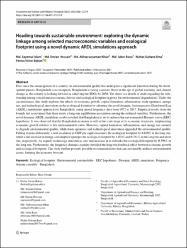| dc.contributor.author | Islam, Md. Sayemul | |
| dc.contributor.author | Hossain, Md. Emran | |
| dc.contributor.author | Khan, Md. Akhtaruzzaman | |
| dc.contributor.author | Rana, Md. Jaber | |
| dc.contributor.author | Ema, Nishat Sultana | |
| dc.contributor.author | Bekun, Festus Victor | |
| dc.date.accessioned | 2023-08-12T12:55:25Z | |
| dc.date.available | 2023-08-12T12:55:25Z | |
| dc.date.issued | 2022 | en_US |
| dc.identifier.issn | 0944-1344 | |
| dc.identifier.issn | 1614-7499 | |
| dc.identifier.uri | https://hdl.handle.net/11363/5282 | |
| dc.description.abstract | Ever since the emancipation of a country, its environmental quality has undergone a signifcant transition during the development phases; Bangladesh is no exception. Bangladesh is facing a serious threat in the age of global warming, and climate
change as the country is looking forward in achieving the SDGs by 2030. Yet, there is a dearth of study regarding the relationship among crucial macroeconomic drivers and ecological footprint (a proxy for environmental degradation). Under the
circumstances, this study explores the efects of economic growth, capital formation, urbanization, trade openness, energy
use, and technological innovation on the ecological footprint by adopting the novel dynamic Autoregressive Distributed Lag
(ARDL) simulations approach for Bangladesh, using annual frequency data from 1972 to 2017. Empirical results from the
bounds test ascertained that there exists a long-run equilibrium association among the outlined variables. Furthermore, the
novel dynamic ARDL simulation results revealed that Bangladesh is yet to achieve the environmental Kuznets curve (EKC)
hypothesis. It was observed that the Bangladesh economy is still at the scale stage of its economic trajectory, emphasizing
economic growth relative to her environmental status. However, capital formation, urbanization, and energy use seemed
to degrade environmental quality, while trade openness and technological innovation upgraded the environmental quality.
Putting it more elaborately, a unit escalation in GDP per capita increases the ecological footprint by 0.829% in the long run,
while a unit increase in energy consumption upsurges the ecological footprint by 1.074% and 0.761% in the long run and short
run, respectively. As regards technology innovation, one unit increase in it cutbacks the ecological footprint by 0.596% in
the long run. Furthermore, the frequency domain causality unveiled the long-run feedback efect between economic growth
and ecological footprint. The study further presents possible recommendations that can sustainably address environmental
issues, keeping the economy buoyant. | en_US |
| dc.language.iso | eng | en_US |
| dc.publisher | SPRINGER HEIDELBERG, TIERGARTENSTRASSE 17, D-69121 HEIDELBERG, GERMANY | en_US |
| dc.relation.isversionof | 10.1007/s11356-021-17375-9 | en_US |
| dc.rights | info:eu-repo/semantics/openAccess | en_US |
| dc.rights | Attribution-NonCommercial-NoDerivs 3.0 United States | * |
| dc.rights.uri | http://creativecommons.org/licenses/by-nc-nd/3.0/us/ | * |
| dc.subject | Ecological footprint | en_US |
| dc.subject | Environmental sustainability | en_US |
| dc.subject | EKC hypothesis | en_US |
| dc.subject | Dynamic ARDL simulation | en_US |
| dc.subject | Frequency domain causality | en_US |
| dc.subject | Bangladesh | en_US |
| dc.title | Heading towards sustainable environment: exploring the dynamic linkage among selected macroeconomic variables and ecological footprint using a novel dynamic ARDL simulations approach | en_US |
| dc.type | article | en_US |
| dc.relation.ispartof | Environmental Science and Pollution Research | en_US |
| dc.department | İktisadi İdari ve Sosyal Bilimler Fakültesi | en_US |
| dc.authorid | https://orcid.org/0000-0002-2968-0375 | en_US |
| dc.authorid | https://orcid.org/0000-0002-1656-7592 | en_US |
| dc.authorid | http://orcid.org/0000-0002-0464-4677 | en_US |
| dc.identifier.volume | 29 | en_US |
| dc.identifier.issue | 15 | en_US |
| dc.identifier.startpage | 22260 | en_US |
| dc.identifier.endpage | 22279 | en_US |
| dc.relation.publicationcategory | Makale - Uluslararası Hakemli Dergi - Kurum Öğretim Elemanı | en_US |
| dc.contributor.institutionauthor | Bekun, Festus Victor | |



















